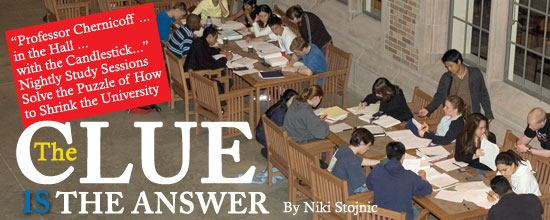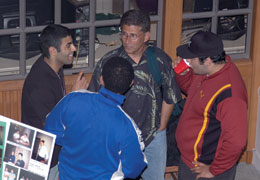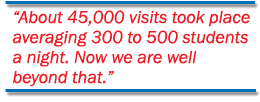

Stan Chernicoff wants to shrink the University of Washington. Not literally, though his mad-scientist bristly hair and metal-framed glasses suggest he could think up a way to do it. Instead, the geology teacher set out two years ago to come up with a plan to make the sprawling UW campus feel more intimate.
"If you could capture the magic of a small liberal arts college and somehow infuse that in a place that has [the UW's] level of excellence," says Chernicoff, "then you'd have the perfect university."
Chernicoff is attempting to tame the sprawl by bringing it under one roof with CLUE, the Center for Learning and Undergraduate Enrichment, an evening study center held in Mary Gates Hall that has no equivalent at any other university in the U.S.
It is part lively study hall, where students can drop in to do the night's homework or solve a sticky problem; and part mini-college, with scheduled sessions for many of the 100- and 200-level lectures such as Introductory Biology, Prehistory of the Northwest Coast, Introduction to Political Theory, and Design Foundations. Chernicoff, an assistant dean in the Office of Undergraduate Education, estimates some 300 students turn up nightly. Predictably, attendance grows during midterm and finals weeks.
Around 6 p.m. Sunday through Thursday, Mary Gates Hall starts buzzing with students who gather with their books, laptops and notebooks at tables set up, Chernicoff says, to "cross-pollinate"—physics students next to language students next to math students.

Upstairs on the second floor, more specialized groups gather. In one room, several large, buff student-athletes are huddled. They greet Chernicoff warmly. They are there for the "nightly mandatory study table," required by coaches so athletes have some blocked-out time for quiet and monitored study.
These classroom sessions are what give CLUE first-of-its-kind billing. They are an opportunity for students, with only 12 to 14 classmates around, to ask questions and go deeper into their lessons, something there usually isn't time for in a hall with hundreds of students and a teaching schedule to keep. Sometimes the class's professor leads the session; others have a teaching assistant or tutor, with professors dropping in occasionally.
Katrina Deines, an associate dean in the College of Architecture and Urban Planning, teaches Appreciation of Architecture during the day and her CLUE sections at night. "I enjoy so much meeting the students in a smaller group. Large classes often have the drawback that they are electives, and students take them because they need the credit, not because they're interested. It surprises them when they find they are interested."
With the UW's undergraduate population hovering around 26,000, students find that getting to know their peers—let alone their professors—is a challenge. "The student-athletes, they live in one world. And the students who study engineering—they're in that complex over there," explains Chernicoff as he points to the east. "The kids in the Greek system, they cross over 45th. The students of color spend their time at the instructional center [a daytime center]. Students who commute to campus, they're all spread out by their living situation and by what it is they choose to study."
 Chernicoff, in a way, specializes in those who orbit outside the main axis of campus life—particularly student-athletes. He spent six years as an assistant athletic director overseeing academic support for all UW student-athletes. He found that the demanding travel and training schedules of athletes often make it impossible to go to nine-to-five study centers or a professor's office hours. Instead, the UW set up a study program just for them. "Four to five students from different teams would sit down if they were all taking Psych 101 together [and] they would talk about the course," he says. Tutors meandered among them ready to help.
Chernicoff, in a way, specializes in those who orbit outside the main axis of campus life—particularly student-athletes. He spent six years as an assistant athletic director overseeing academic support for all UW student-athletes. He found that the demanding travel and training schedules of athletes often make it impossible to go to nine-to-five study centers or a professor's office hours. Instead, the UW set up a study program just for them. "Four to five students from different teams would sit down if they were all taking Psych 101 together [and] they would talk about the course," he says. Tutors meandered among them ready to help.
"It resonated with me that it was a wonderful thing for the student-athletes, and it has the effect of shrinking the University down to a more human size," says the effusive Chernicoff, who was influenced by his own mega-university experience. He was one of more than 50,000 students at the City University of New York at Brooklyn, and completed his graduate studies at the University of Minnesota, "a big state university very much like the UW."
The well-loved professor has earned numerous accolades: Most recently, he won the 2005 James D. Clowes Award for the Advancement of Learning Communities. In 2000, he won a UW Distinguished Teaching Award. His Introduction to Geological Sciences class (popularly known as "Rocks for Jocks") has attracted droves of students over the years. In it, Chernicoff is famous for "shrinking the University" by memorizing all of his students' names.
 But it wasn't until he watched the athletes' study groups that Chernicoff got the idea for CLUE. Why not let everyone on campus benefit from this study system? In early 2003, he ran the concept by his students and those who run the other study centers on campus. He assured everyone that CLUE would open when the other centers close to avoid overlap. The response was enthusiastic.
But it wasn't until he watched the athletes' study groups that Chernicoff got the idea for CLUE. Why not let everyone on campus benefit from this study system? In early 2003, he ran the concept by his students and those who run the other study centers on campus. He assured everyone that CLUE would open when the other centers close to avoid overlap. The response was enthusiastic.
Meanwhile, Dean of Undergraduate Education George Bridges (who has since left for Whitman College) helped secure funding, which comes out of the $250 enrollment and matriculation fee that entering students pay.
But for all of the encouragement Chernicoff received for his bright idea, he knew the real test would come on opening day. "We didn't know whether 100 students would come in, or a thousand," he says.
In fact, that first night in October 2003, CLUE welcomed all of six students, who came for the drop-in study tables. But Chernicoff refused to be discouraged.
Go To: Page 1 | Page 2